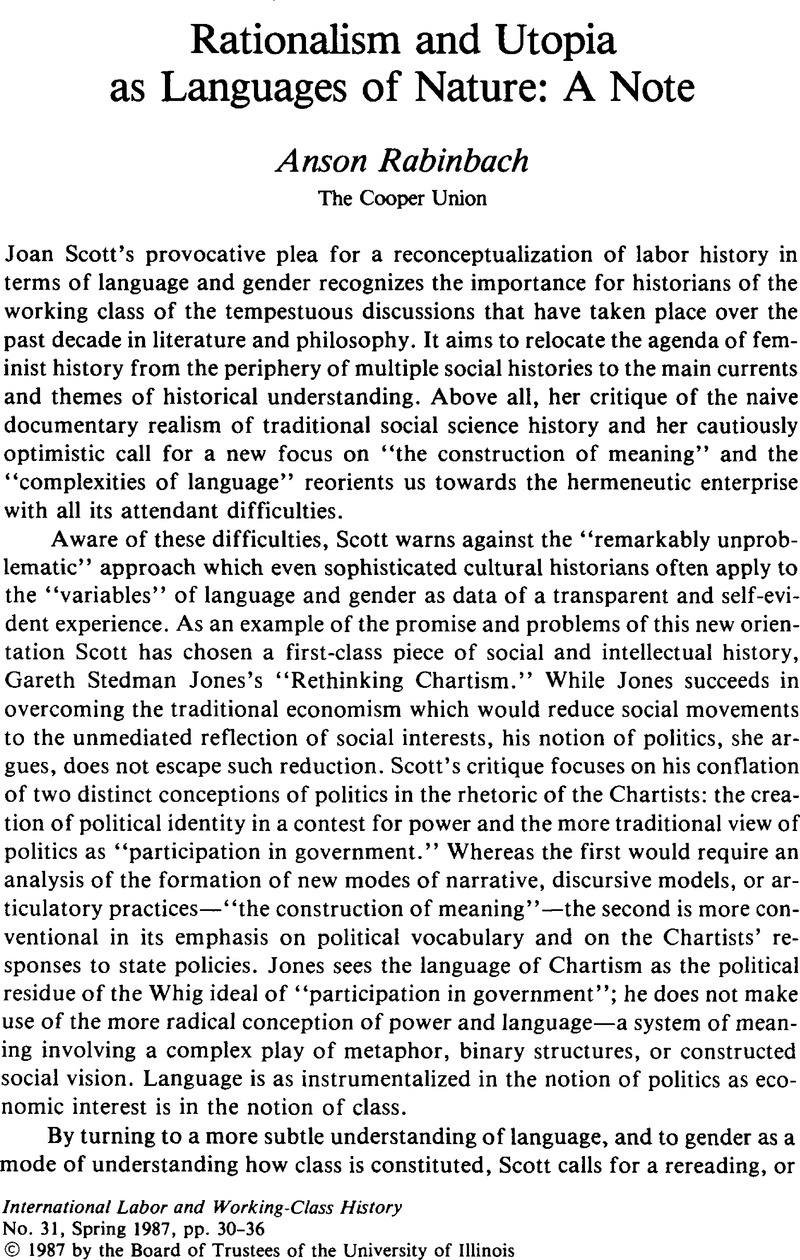No CrossRef data available.
Article contents
Rationalism and Utopia as Languages of Nature: A Note
Published online by Cambridge University Press: 16 December 2008
Abstract

- Type
- Scholarly Controversy
- Information
- Copyright
- Copyright © International Labor and Working-Class History, Inc. 1987
References
NOTES
1. See de Man, Paul, “The Resistance to Theory,” in The Pedagogical Imperative, Yale French Studies No. 63, ed. Johnson, Barbara (New Haven, 1982), 11.Google Scholar
2. Rajchman, John, Michael Foucault: The Freedom of Philosophy (New York, 1985), 85–97.Google Scholar
3. This view of Foucault attributes more significance to the earlier texts on language, The Order of Things (London 1970)Google Scholar and The Archeology of Knowledge (London 1972)Google Scholar, than to his later works, especially Discipline and Punish (New York 1977)Google Scholar. Ironically, although Discipline and Punish is probably most accessible to historians, it tends to collapse power and knowledge into a single concept, thus avoiding some of the more productive, but also unresolved, aspects of his earlier works on forms of thought.
4. A most trenchant critique of the historian's oblivousness to the nature of written sources is La Capra, Dominick, “Rethinking Intellectual History and Reading Texts,” in Rethinking Intellectual History: Texts, Contexts, Language (Ithaca, 1983), 23–71Google Scholar; “Rhetoric and History”, in History and Criticism (Ithaca, 1985), 15–44.Google Scholar
5. See White, Hayden, “The Historial Text as Literary Artifact,” Tropics of Discourse: Essays in Cultural Criticism (Baltimore and London, 1978), 81–100.Google Scholar
6. An excellent review of the conundrums of post-structuralist criticism is Norris, Christopher, Contest of Faculties: Philosophy and Theory after Deconstruction (London, 1985), 19–47.Google Scholar
7. Derrida, Jacques, “Cogito and the History of Madness,” Writing and Difference, trans. Bass, Alan (Chicago, 1978), 31–63.Google Scholar
8. In his recent critique of post-structuralist theory Jürgen Habermas has even attempted to regain ground for critical rationalism by demonstrating that Foucault's critique is not inconsistent with a tradition of rationalism that has always questioned the limits of reason. See Habermas, Jürgen, Der philosophische Diskurs der Moderne (Frankfurt am Main, 1985), 279–312Google Scholar; also see his obituary for Foucault, , “Mit dem Pfeil ins Herz der Gegenwart: Zu Foucault's Vorlesung über Kants ‘Was ist Aufklärung’,” Die neue Unübersichtbarkeit (Frankfurt am Main, 1985), 126–31Google Scholar. Other attempts to contrast the German tradition of critical theory with Parisian developments include: Huyssen, Andreas, “Mapping the Postmodern,” New German Critique 33 (Fall 1984): 5–52CrossRefGoogle Scholar; Benhabib, Seyla, “Epistemologies of Postmodernism: A Rejoinder to Jean-Francois Lyotard,” New German Critique 33 (Fall 1984): 103–26CrossRefGoogle Scholar; Dews, Peter, “Adorno, Poststructuralism and the Critique of Identity,” New Left Review 157 (05/06 1986): 28–44.Google Scholar
9. Veyne, Paul, Foucault révolutionné l'histoire (Paris, 1978), 211.Google Scholar
10. Macpherson, C. B., The Political Theory of Possessive individualism: Hobbes to Locke (Oxford, 1962), 217.Google Scholar
11. Ibid., 225.
12. Fox-Genovese, Elizabeth, “Property and Patriarchy in Classical Bourgeois Thought,” Radical History Review 4 (Spring/Summer 1977): 52.Google Scholar
13. Jones, Garetti Stedman, “Rethinking Chartism,” Languages of Class: Studies in English Working Class History, 1832–1982 (Cambridge, 1983), 126.Google Scholar
14. Taylor, Barbara, Eve and the New Jerusalem: Socialism and Feminism in the Nineteenth Century (New York, 1983), 26.Google Scholar
15. Habermas, Jürgen, “Dialektik der Rationalisierung,” Die neue Unübersichtlichkeit, 171.Google Scholar
16. The Utopian Vision of Charles Fourier: Selected Texts on Work, Love and Passionate Attraction, ed. Beecher, Jonathan and Bienvenu, Richard (Boston, 1971), 216.Google Scholar
17. On Fourier's mania for numbers and order, see Barthes, Roland, Sade, Fourier, Loyola, trans. Miller, Richard (New York, 1976), 103Google Scholar. His sexual utopia is a carefully orchestrated orgy with precisely worked out social hierarchies and rituals, and inspections of mutual partners. For an amusing description see Roelofs, Joan, “Fourier and Computer Dating,” Telos 65 (Fall 1985): 127–36.CrossRefGoogle Scholar
18. For an even more excessively polarized discussion of the politics of democracy versus the politics of utopia, see Féher, Ferenc, “Paradigms in Radical Politics,” Telos 63 (Spring 1985): 147–56CrossRefGoogle Scholar; Whitebook, Joel, “The Politics of Redemption,” and the response by Paul Breines, “Redeeming Redemption,” Telos 65 (Fall 1985): 56–68, 152–58.Google Scholar
19. Benhabib, Seyla, “The Utopian Dimension in Communicative Ethics,” New German Critique 35 (Spring/Summer 1985): 94.Google Scholar
20. Keller, Evelyn Fox, Reflections on Gender and Science (New Haven, 1985), 106.Google Scholar
21. See for example, Pilkington, A. E., “Nature as an Ethical Norm in the Enlightenment,” in Languages of Nature: Critical Essays on Science and Literature, ed. Jordanova, Ludmilla (London, 1986), 51–85Google Scholar; Schiebinger, Londa, “Skeletons in the Closet: The First Illustrations of the Female Skeleton in Eighteenth Century Anatomy,” Representations 14 (Spring 1986): 42–82.CrossRefGoogle Scholar
22. Barthes, Roland, “The Division of Languages,” The Rustle of Language, trans. Howard, Richard (New York, 1986), 119.Google Scholar
23. Rancière, Jacques, La nuit des prolétaires: Archives du reve ouvrier (Paris, 1981).Google Scholar


